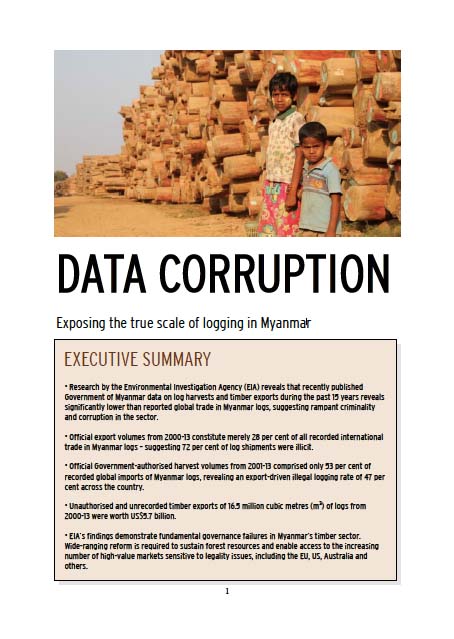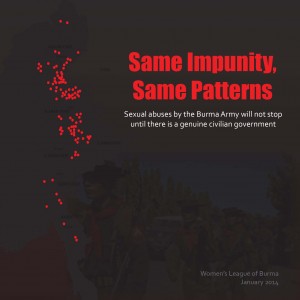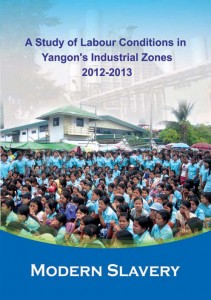Campaign Resources (403 found)
Commentary: Trade, development and the smokescreen of CSR
As states across the world have embraced the idea that markets can work for the poor, CSR has become a crucial part of a discourse which sees the primary function of government as creating an enabling environment for business. It is perhaps not surprising, then, that the present ‘transition’ of Burma – a nation of untapped consumer markets, abundant natural resources, and a comparatively cheap labour force – has CSR at its heart […]
• • •Joint Statement of Concern by Shan Civil Society Organizations Regarding Public Meeting by Burmese Government and Hydrochina to Promote Dams on the Salween and Nam Ma Rivers
We, the undersigned Shan organizations, are very concerned by the recent public meeting held by representatives of Burma’s Ministry of Electricity, the International Group of Entrepreneurs Co., Ltd. and Hydrochina Corporation in Tangyan township on March 17, 2014, to promote plans to build the Nawng Pha dam on the Salween river and the Mann Taung dam on the Nam Ma river, a Salween tributary […]
• • •Data Corruption: Exposing the True Scale of Logging in Myanmar
 The Environmental Investigation Agency (EIA) released a new briefing Data Corruption: Exposing the true scale of logging in Myanmar, scrutinizing official figures on log harvests and timber exports over the past 15 years.
The Environmental Investigation Agency (EIA) released a new briefing Data Corruption: Exposing the true scale of logging in Myanmar, scrutinizing official figures on log harvests and timber exports over the past 15 years.
Myanmar’s Six Billion Dollar Timber Corruption Black Hole Revealed by Official Data
LONDON: New analysis of the Myanmar Government’s forestry and trade data points to a multi-billion dollar illegal logging and exports black hole – indicating widespread criminality and official corruption[…]
• • •People of ASEAN Stand Up To Be Counted
The ASEAN Civil Society Conference / ASEAN People’s Forum (ACSC/APF) 2014, held in Yangon, Myanmar, on 21-23 March, and coorganised by long-standing Myanmar advocates to ASEAN, namely Burma Partnership, Task Force on ASEAN and Burma, and Women’s League of Burma, together with 80 other civil society organizations (CSOs) and community based organizations (CBOs),can be hailed […]
•Same Impunity, Same Pattern: Sexual Abuses by the Burma Army Will Not Stop Until There is a Genuine Civilian Government
 Almost a decade ago, the Women’s League of Burma (WLB) denounced systematic patterns of sexual crimes committed by the Burma Army against ethnic women and demanded an end to the prevailing system of impunity. Today WLB is renewing these calls. Three years after a nominally civilian government came to power; state-sponsored sexual violence continues to threaten the lives of women in Burma.
Almost a decade ago, the Women’s League of Burma (WLB) denounced systematic patterns of sexual crimes committed by the Burma Army against ethnic women and demanded an end to the prevailing system of impunity. Today WLB is renewing these calls. Three years after a nominally civilian government came to power; state-sponsored sexual violence continues to threaten the lives of women in Burma.
Women of Burma endure a broad range of violations; this report focuses on sexual violence, as the most gendered crime. WLB and its member organizations have gathered documentation showing that over 100 women have been raped by the Burma Army since the elections of 2010. Due to restrictions on human rights documentation, WLB believes these are only a fraction of the actual abuses taking place […]
Training War Criminals? – British Training of the Burmese Army
This briefing examines the British government’s controversial military training to the Burmese Army.
The training is taking place despite the Burmese Army still committing serious human rights abuses which violate international law. Crimes committed by the Burmese Army since the reform process began include rape and gang rape of ethnic women, including children, deliberate targeting of civilians, arbitrary execution, arbitrary detention, torture, mutilations, looting, bombing civilian areas, blocking humanitarian assistance, destruction of property, and extortion. Many of these abuses could be classified as war crimes and crimes against humanity […]
• • •Villagers in Eastern Shan State Suffer Forced Labour and Extortion by Burma Army Troops Guarding Loggers in Salween Dam Flood Zone
Villagers in Murng Paeng township are being used as forced labour by Burmese government troops giving security to military-linked logging operations above the planned Ta Sang dam on the Salween River. The loggers are clearing out teak forests from the projected flood zone for export to neighbouring countries […]
• • •Statement No. (4/2013) On the International Human Rights Day
1. On the International Human Rights Day, the Myanmar National Human Rights Commission (MNHRC) joins the international community in celebrating this auspicious day […]
• • •Modern Slavery: A Study of Labour Conditions in Yangon’s Industrial Zones
 With Myanmar going through a period of transition and the space for civil society is expanding, the role of labour unions in promoting and protecting fundamental rights of workers is vital yet the challenges they face in the current environment are huge.
With Myanmar going through a period of transition and the space for civil society is expanding, the role of labour unions in promoting and protecting fundamental rights of workers is vital yet the challenges they face in the current environment are huge.
Workers in Yangon’s 13 industrial zones work in unsafe, hot, overcrowded factories, typically for around 11 hours per day […]

 All posts
All posts